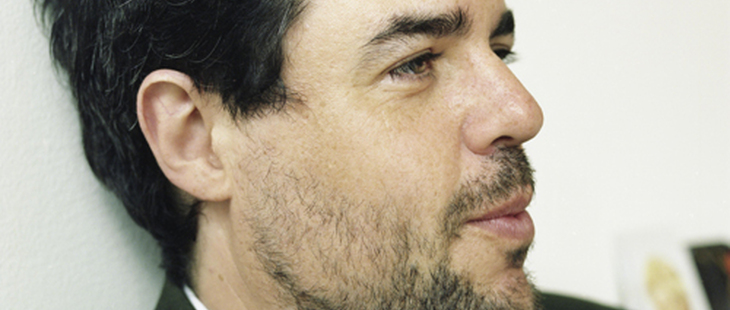
Misha Glouberman is a anecdotist of seemingly-obvious-yet-deeply-profound insights on charades, Harvard, monogamy, why a computer only lasts three years, and how wearing a suit all the time is a good way to quit smoking. Among many, many other things.
The Toronto-based artist, performer, and unconference facilitator, is probably best known as a host of the Trampoline Hall lecture series, and staging Terrible Noises for Beautiful People—a public noise-making improvisation event. This past summer he published The Chairs are Where the People Go (co-authored with Sheila Heti), which The New Yorker described as a “triumph of what might be called conversational philosophy.”
This week Glouberman throws himself into another topic, one that figures briefly in his book—negotiation. Starting tomorrow, he’s teaching “How to Talk to People about Things”, a six-week course in negotiation and communication presented by the Justina M. Barnicke Gallery at the University of Toronto’s Hart House. The Standard caught up with Glouberman to decide if we need to sign up.
Describe the Misha Glouberman School of Learning.
For several years I’ve been teaching classes, mostly in a variety of “unuseful” subjects. I taught a class in how to play charades, a bunch of classes in improvised noise-making for non-musicians, things like that. Those projects are offered by the Misha Glouberman School of Learning.
Tell us about your upcoming six-week workshop on “Negotiation & Communication” at the University of Toronto.
This will be the first directly useful class I’ve taught through the School of Learning. I did a trial version of it with friends this past spring, which went really, really well I think, and this is the first time it’s being offered to the general public. It’s about how to talk to people who want different things from you, or who see things differently from you, which is pretty much everyone.
What sparked your interest in negotiation?
I think I’ve always been interested in how people see things differently, and how hard it can be to overcome that. What really got me thinking about this in a concrete way was spending a couple of years being involved in neighbourhood politics and starting a residents association. Our association had certain things we wanted, and it was really easy for things to get very antagonistic very quickly, for us to get into fights with local businesses, with people at City Hall.
I was sort of figuring out for myself that there was a better way to deal with these conflicts and differences of opinion, when a friend of mine, David Eaves, introduced me to some of the literature on negotiation—work developed at the Project on Negotiation at Harvard Law School. He was involved in teaching classes in this, with a local company called Common Outlook, run by Peter Hiddema. They invited me to sit in on some classes and I was instantly amazed—the material was really great and clarifying and helpful and fantastic. I’ve spent a lot of time at those classes, first as an observer, and then helping teach.
You’re known for using spontaneous, highly participatory and arguably unconventional methods of teaching. (Quite the shift from your Harvard education, I can imagine). What sorts of activities can participants anticipate?
Well, this will be pretty different from what I usually do at the School of Learning. This isn’t going to be like “how to negotiate by running around and making noises,” or anything like that. This is pretty traditional compared to my other classes. But it’s still very participatory: Only a very small part of the class is spent with me standing up and talking. There are games and exercises, a certain amount of role play.
The topics and exercises are a sort of mix of things—mostly drawn from that program on negotiation at Harvard Law School, but also a few other sources. Some of it is pretty pragmatic work about joint problem-solving, some of it’s more personal/emotional material about how people respond to situations of conflict or difficulty, and how to handle that.
How does your background in charades and improvisation find its way into your classes?
I’m not entirely sure yet. I do a bunch of work doing participatory performance things: the charades classes, and noise events, and Trampoline Hall. I also do a lot of other work, which is also about participation and connection, but is a lot more practical: I have a business called Collective Intelligence, where organizations hire me to design and run conferences where participants can connect with each other in useful ways. I have this strong interest in negotiation. I’m still learning out how all of these things connect with each other. Figuring out how they all fit together is part of what makes this fun and interesting for me.
Does being a good improviser help one negotiate more effectively?
I suppose so, yeah. Traditionally, being a good improviser means being to adapt, to see different possibilities, and, especially, to able to listen. Those are all good skills for a negotiator, too.
That said—they’re not the same thing. I used to occasionally get hired to do improv or charades classes for businesses, to help their employees be more creative, or better communicators, or whatever. I’m not sure I believe that’s the most useful approach. If you want to be a better communicator, better to take a class in how to be a better communicator, not an improv class. I suppose that’s part of why I’m teaching this class now.
What’s your best advice to people hoping to communicate better (aside from coming to your classes)?
Try to understand the other person’s point of view. That sounds really simple and obvious and maybe even a bit polyannaish. But it’s incredibly important, and really challenging, and the implications of it are complicated.
It’s emotionally really hard to try to understand someone else’s perspective when you’re in a situation of conflict with then. And for people to really understand each other’s points of view, they need to be able to share information with each other, which can be challenging, too.
Of course, understanding their point of view doesn’t mean you have to agree with them. But it’s important, just from a pragmatic point of view, if you want to solve problems, to learn to overcome the natural inclination to think that your own viewpoint is the whole truth, and the accompanying inclination to shut out other points of view.














